Kae Cheatham's Blog: Whoa! Another Author?, page 16
March 7, 2011
International Women's Day - titles

March 8 is the centennial of International Women's Day with 172 events in the US. This event was the driving force behind the Women's History Month in the U.S. With this auspicious occasion, I thought I'd highlight my very own "Women's Day" titles where the protagonists mirror reality—strong, assertive women (and girl).
Spotted Flower and the Ponokomita
This middle-school chapter book takes place in the 1730s--the era when the American Indians of the Northern Plains got their first look at a horse (ponokomita). From accurate research, I present a lifestyle that existed thousands of years before the horse arrived to the area; but the main story is a lively adventure of a girl, Spotted Flower, who comes across a horse and takes it back to her people along with information needed to rescue two of her friends who have been kidnapped.
Available in print and as a Kindle ebook
Kansas Dreamer: Fury in Sumner County
It's spring, 1868, and a businessman in Sumner County, Kansas, has been brutally murdered. Not only does Ellen Hargrove find the body, but within days, she believes James Montgomery committed the crime. But how to convince anyone? Her knowledge isn't based on evidence, but rather on her own clairvoyant visions. Now, with conflicting images, and only bits of information strewn in dreams and visions, Ellen puts her life in danger to prove what she knows is true.
Available in print and for Kindle and Nook
The Adventures of Elizabeth Fortune
In 1870, Elizabeth Fortune is more spunky than most young women, but those attributes are often a cover for the despair she feels at being without family. Her white mother died when she was five, and her black-Indian father is in the Southwest with the Ninth Cavalry. When Elizabeth's maternal grandfather disowns her, she is forced to quit her college studies. She heads West, certain that when she finds her father, her life will stop its rough tumble. But her trip produces a variety of hardships. Adventures? Misadventures? How will she survive?
Available in print and for Kindle.
In the depths of a rock-shrouded realm the people call the Always Dark, a once-technological culture is reduced to feudal levels, both scientifically and socially. Social debacles and political intrigue drive protagonist Dwinn Somuron to escape enslavement and find a way to lead her people to a better life.
Available in print and for Kindle and Nook
Juilan Pranss is just a lowly government employee on a space-faring planet. Or is she? Juilan suddenly isn't sure after she's spirited from a spaceliner, kidnapped and continually under threat on a distant planet she knows little about. During this time, she keeps having disturbing visions and begins to believe she is possessed. With doubt and danger at every turn, Juilan learns incredible truths about her background and the world into which she has been forced. Once she accepts the astounding realities, she must still evade her psychotic half-brother and handle the century-old Evincor—the indomitable gemstone that is the very basis of the culture—in a ceremony that could cause her death.
Available in print, on KINDLE and Nook
Do you have a particular book you've read or written that celebrates women? Leave the title and link, please. I'd like to check it out.
Happy Day!March 6, 2011
ECHO - Review
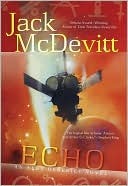
Jack McDevitt is a master at presenting humanity of the future in terms we can identify with today. ECHO is a fine example of this. In the far future, when people are flung throughout several galaxies, ECHO shows how humanity still yearns to answer a basic question: Are we alone? Are other sentient, conversant people somewhere primed for contact?
In ECHO, antiquarian Alex Benedict (this is the fifth book in the series) is curious about an artifact he see advertised for sale. It has unknown glyphs on it and is very large. Benedict learns the object once belonged to the late Sunset Tuttle--a man renown for his SETI-type searches. The object goes missing, and all Benedict has are visual facsimiles. When he sets out to investigate what happened to the object, events become both puzzling and dangerous.
This pursuit is not handled solely by Benedict. Although he initially recognizes a mystery that begins the adventure and always deduces the solution, the Benedict novels are written as first-person accounts by Chase Kolpath. Chase is the administrative assistant for Benedict's antiquities company. She is also Benedict's pilot, both on world and off; when action heats up, Chase is at the center of conflict resolution.
Each adventure (book) is a memoir, recording Chase's perspective of events. She sets the story down for people of her era, although she often puts in asides: "The station's name, as you probably know, is Tsarendipol..." (page 104). On page 288, after a particularly dangerous misadventure, she shrugs off Benedict's apology and writes, "...when I started putting this memoir together, I'd intended to leave this sequence out...Alex advised me to tell the whole story."
This styling of the book allows a casual comfort when the future technology and circumstances are related. Nothing is overly explained and it's easy to accept everything presented, such as jackets that, when you put them on, automatically adjust heating for different temperatures (I wish I had one of those!). The language and writing are strong.
As a mystery, the unfolding story of what happened to the object and why has abundant tension, a few red herrings and plenty of action. ECHO is a 2011 Nebula nominee, and I wouldn't be surprised if Jack McDevitt takes top honors.
March 5, 2011
Women's History Month #2

Ever hear of Ann S. Stephens (1810 – 1886)? Along with being an accomplished writer of several novels, wife and mother, editor of a literary magazine, she wrote the first "dime novel" that was published on June 9, 1860 by I.P. Beadle & Co. Title: Malaeska, the Indian Wife of the White Hunter; this was the first of a seven-volume series.
How about B. M. Bower, (1871-1940) (nee: Bertha "Muzzy" Sinclair), who published more than 65 novels about the West, as well as short stories.
And of course, Phillis Wheatley (ca. 1753 – 1784), the first American woman to try to support herself through her writing and the first African-American to ever be published.
I'm a reader and a writer. These are women who paved my way.
March 4, 2011
Bone and Jewel Creatures - Review
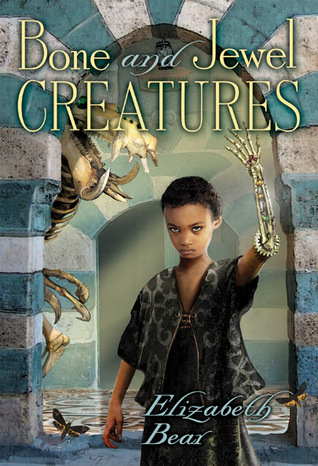
Stories about wizards and sorcery aren't usually my preference; the interesting title and cover compelled me to take this from my public library shelf.
I was not sorry. Elizabeth Bear's story about a wizardry power struggle was--enchanting :-)
Protagonist Bijou, is an artificer who creates and animates creatures from bone, gem and other inanimate objects. She is old, and her thoughts and struggles with her infirmities are well told. The reader will also sense she has a "past." This aspect of mystery is enhances when her former apprentice and colleague, Brazen the Enchanter, brings her a feral child with a withered and festering arm. Bijou agrees to help the child, although she feels discomfited by the circumstances. Her worries are substantiates when she discovers a purposefully placed item in the child's rotting hand that is causing the limb deterioration. She suspects who has done this, but isn't sure why.
In this well-written novella, Bear gives three points of view: Bijou, Brazen, and the child Emeraude. Bear moves effectively from one to the other in clearly-delineated passages that add dimension to the story. The writing and vivid descriptions quickly immersed me in this magical world, from Bijou's workshop and her intricate companions she constructed, to the surrounding City of Jackals. I enjoyed the book, and the brevity seemed fitting for the story. Too much more could have been too much.
March 2, 2011
The Glass Rainbow - Review
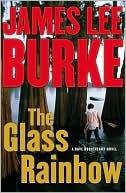
Dave Robicheaux is an ongoing series character [more than 16 titles] I hadn't read other Roicheaux books and was relieved not to feel left out with his personality. In this story, Robicheax follows a possible lead about the murder of a young woman. This sends him to other leads and on various interviews and confrontations with some well-presented characters. Characterization is one of Burke's strong suits. Other murders take place and Robicheaux's instincts send him along dangerous paths.
My descriptions is without detail to avoid spoilers. The convolutions within this novel, including involvement of family members and friends, are so many even author Burke didn't get them all sorted. As a mystery, this didn't work for me.
1) The protagonist didn't investigate as much as he did instigate.
2) I like police procedural stories, and this didn't have much; in fact there were lots of rules broken.
3) I wasn't satisfied with the ending and some writing style elements detracted. Burke uses first person for the Robicheaux sections, but also presents other characters in third person. Although the writing and use of language was all top drawer with vivid descriptions and character depictions, I found the third person segments to be superfluous, often detracting from the story. The information from those segments was rehashed in the Robicheaux scenes, and the tension of the supposed-to-be-gripping finale of the book was diluted by a third person presentation.
Development of the protagonist's foibles and concerns were quite good, and when I began to think of The Glass Rainbow as a novel, not a mystery, I liked it much better. In all, I felt it was a 2-star mystery and a 3-star novel. I know I'll remember the characters and emotion of the story.
March 1, 2011
Women's History Month

Today is the beginning of the U.S. Women's History Month (WHM). Many events are going on at different places, like the The Library of Congress as well as the organization's site.
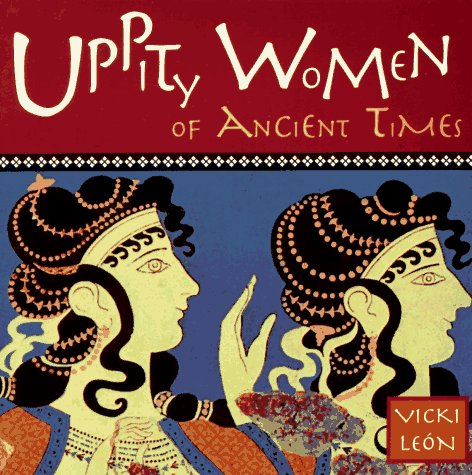
A fine book to start the month is Vicki Leon's Uppity Women of Ancient Times. It's one of several of Leon's Uppity Women books, and they fit right into this year's WHM theme, "Our History is Our Strength." Leon's book has a selected bibliography for more info, and a good index to find one of the 200 or so entries in this book. Uppity Women is written in a lively style that can be enjoyed by everyone.
February 28, 2011
The First Tycoon – Review
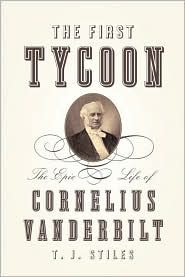
This book, The First Tycoon by T.J. Stiles, was on an A. Knopf recommended reading list, and I borrowed it from my local public library.
I used to live in a city where Vanderbilt was the name of the major university and medical center. I lived there for more than two decades, but knew nothing about the family or the patriarch, Cornelius Vanderbilt, who had amassed a fortune in the 19th century.
I completed only one-third of this very hefty book, simply because I'm not fond of biographies. But the 230+ pages I read were enough to realize the excellent biography and historical writing skills of Stiles. He begins with the background of the parents of Cornelius, with interesting commentary on the attitudes of New World inhabitants and late 100 economics. When Cornelius is introduced I had a firm grasp of his word. The early-to-mid 19th Century are the years I have researched and used in my fiction books, so learning more detail appealed to me. Stiles presented the facts with a comprehensible style. I acquired an excellent sense of what it was like to live and conduct business in the New York/New Jersey port towns—big and small.
Although I didn't complete the book, I suggest it is a 4-star (or higher) book to biography lovers.
February 23, 2011
I Read, I Think
This goes beyond trivia. Just right for for Black History Month: "Washington: the Blackest Name America"
=======Are we really losing language? Or maybe it's just that more people who never before had a voice are finally getting their say—albeit disjointedly.
======="Our collective humanity is dying a little more every day. Technology is killing life on the street -- the public commons, if you please. Chat rooms, text messaging, IM are all, technically, forms of communication. But when they replace yakking over the back fence, or sitting huggermugger at the bar or simply walking with a friend -- as they have for an increasing number of people in "advanced" societies -- then meaningful human contact is lost."...
Here's the entire article, and I wonder, is the personal form of communication also the basis of storytelling and book writing? What do you think?
February 20, 2011
Black History Month Author #5

Here are two people often overlooked in references to Black American authors. I find their lives quite fascinating.
Jessie Redmon Fauset (1882–1961), born in New Jersey, graduated Cornell University 1905 and was the first African-American woman Phi Beta Kappa. She is the author of four novels, and has more than 70 other published works, many first appearing in The Crisis (a journal at the heart of the Harlem Renaissance) for which she served as Literary Editor.
Learn more about this inspired American woman at African American Literature Book Club and Good Reads
==========
Alain LeRoy Locke (1885-1954) is considered the philosopher of the Harlem Renaissance. Born in Philadelphia, Locke graduated from Harvard University in 1907 and was the first black Rhodes Scholar. He studied at Oxford and the University of Berlin, then received a Ph.D. in philosophy from Harvard in 1918. He edited and wrote numerous articles, anthologies, and books about black life and culture. Locke taught at Howard University in Washington, D.C., for nearly 40 years.
February 18, 2011
Young Writer Wins Awards
Eight-year-old Brooklyn Wright has written another book The Adventures of the Earth Saver Girl. The book took the second place 2010 National Award for Litter Prevention from
Whoa! Another Author?
- Kae Cheatham's profile
- 24 followers



